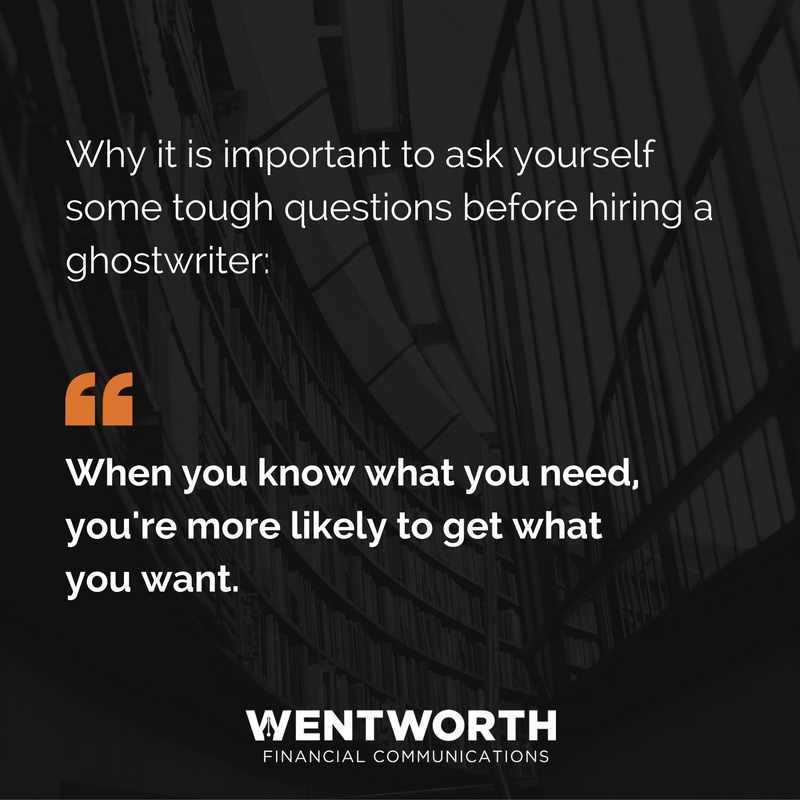So you’ve decided it’s time for your firm to hire a financial ghostwriter to work on your white papers, blog, newsletters, or other thought-leadership efforts. Now what?
Finding a writer who understands the technical aspects of your industry and can capture your firm’s voice obviously is a huge part of the process. And to help with that, we created a checklist of questions to ask when interviewing potential writers.
But there also are some important questions that you need to ask yourself before committing to working with a ghostwriter. Whether you’re an asset management, investment banking, private equity, accounting, or other type of financial services firm, here are questions you should ask to make sure the project goes smoothly.
Questions to Ask Yourself When Hiring a Ghostwriter
Why, exactly, do we need a ghostwriter?
Take some time to assess and articulate your objectives in hiring an outsourced writer. Is your biggest challenge not having the internal bandwidth to take on the project? Or do you not have someone on your team with the writing skills needed to tackle a project like this? Maybe it is a combination of both. Whatever the situation is, knowing what your pain points are allows you to clearly define the engagement and find the partner.
Where are we in the writing process?
If you already have a first draft that just needs polishing and editing, that requires a different relationship with your ghostwriter than if you are starting from scratch and need a writer who can guide you through every step of the process. Be realistic about where you are in the process.

Have we already gathered all of the research we need?
If not, you will want to be sure you’ve found a writer who is comfortable doing some independent research. Some writers are very good at navigating databases and gathering statistics for charts and graphs; other writers struggle with this aspect. It’s essential to define research responsibilities from the outset, as this can become a roadblock if there’s a mismatch between your needs and your writer’s strengths.
What’s our deadline for finishing the project?
No, “as soon as possible” doesn’t count as a deadline. Establishing checkpoints and deadlines will be another key to a successful relationship with your ghostwriter. If you have a firm deadline – a submission date for a conference, for example – you will need to find a writer who is able to deliver the final draft within that timeframe. Writers work at different speeds, and the turnaround time will likely depend on how many other projects the writer has in his or her queue. Occasional checkpoints along the way allow you to be sure you’ll get what you’re looking for.
Do we have any examples of existing pieces that we want to emulate?
When you sit down with your ghostwriter to discuss the project, it can be very helpful to show the writer examples of pieces that are similar to what you are looking to create – in terms of style, format, or tone. This allows the writer to see tangible examples of the target you’re looking to hit. On a practical note, providing examples may result in a lower price because the writer doesn’t have to guess at what you’re looking to create. Just like investors need to account for risk and uncertainty, writers need to price any uncertainty into their estimates.
What’s our budget?
As with most things in life, you get what you pay for when it comes to writers. Writers who have deep experience in financial services and specialize in thought-leadership pieces often charge more than generalist writers. That expertise is often well worth the investment if you want a high-quality finished product. For that reason, it’s important to go into the project with an idea of 1) how much you can afford to spend and 2) how important the piece is to your marketing and sales efforts. Be sure that your goals, tasks, responsibilities, and budget are defined at the outset of the engagement, so you and your writer both know how to plan for the project.
Will we design the finished piece ourselves?
If you have an internal design team, the ghostwriter’s job is to create a Word document and then provide input to your designers on the creation of supporting elements like charts and tables. If you don’t have an internal design team, you will need to decide how you want to turn the draft into a finished product. Many writers also provide design services, either internally or by partnering with a design firm. If you don’t have internal design capabilities, it can be easier to have the writer manage that process rather than working with two vendors –a writer and a designer – separately.
Do we need help distributing the content?
Content is only valuable if you get it in front of the right people. Some writers can help you develop a strategy for content distribution through e-mail marketing, social media, media outreach, guest blogs, and other channels. It’s important to remember that design and distribution tasks may be beyond the scope of an initial writing engagement, so if you know you’ll need these services you will want to discuss them from the outset with your ghostwriter.
When you know what you need, you’re more likely to get what you want. By finding the ideal ghostwriter for your thought-leadership efforts, and communicating clearly about your goals, tasks, and budget, you can create a valuable partnership for turning your expertise into the white papers, e-books, blogs, and articles your business needs to grow.
About the Author
 Scott Wentworth is the founder and head writer of Wentworth Financial Communications. He has served as a ghostwriter for portfolio managers, investment bankers, attorneys, and other thought leaders across the financial services industry. It took all the willpower he could muster to not include “Who You Gonna Call?” in the title of this blog post.
Scott Wentworth is the founder and head writer of Wentworth Financial Communications. He has served as a ghostwriter for portfolio managers, investment bankers, attorneys, and other thought leaders across the financial services industry. It took all the willpower he could muster to not include “Who You Gonna Call?” in the title of this blog post.
